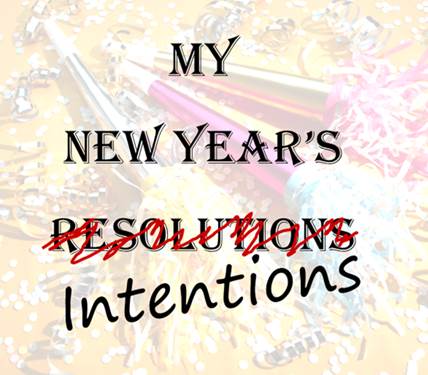January 1 marks the time people sit down and think about what they want to change for the upcoming year, which usually leads to making New Year’s resolutions. People are excited and filled with fresh new energy and jump into their plan with gusto! Then just a few short weeks later, when all that new energy and motivation is gone, so is their resolution. In fact, studies show that only 4-8% of people achieve their New Year’s resolution. Why? Change is hard, and how we approach and think about change and growth matters. As a dietitian, many people may not realize it, but I specialize in helping people change their habits. Every day I help people identify their barriers to change and problem solve ways to work through them and achieve success. I know firsthand that how you think about and approach change plays a huge role in how successful you are in making that change long term. Which brings me to the topic of the day: why you should set a New Year’s intention instead of a resolution.
The definition of the word resolution is a firm decision to do or not to do something. When people make a resolution, they are stating that starting right now I am doing (or not doing) this thing! Some of the most common New Year’s resolutions are “lose weight” “get healthy” “spend less money”. Resolutions often don’t have any sort of plan or goals along the way, and they don’t have any wiggle room for mess ups and failure. They often focus on things we want to change because we don’t like them. And usually they are focused on the end result. When you think about your New Year’s resolution, likely you are picturing yourself at the end of the year, achieving that resolution; happy and proud. What gets left out of that thought is the constant work and effort that it takes to achieve a goal. Change takes effort, planning, time and self-compassion. Life is a journey and there will be things that come up that make change hard. The problem with resolutions is, as soon as people slip up or run into a roadblock, they already feel like they have failed at their resolution. That they can’t do it. And then, people usually give up. They decide that it was just too hard, or it wasn’t for them, or maybe next year.
The definition of intention is a thing intended; an aim or plan.
The definition of intention is a thing intended; an aim or plan. Intentions are not tied to a specific outcome, they are about the overall plan and general direction you want to go. They ask that we bring mindfulness to our actions and make efforts to change. They allow us to have wiggle room to be an imperfect human. By keeping our focus on intentions, then, when we fall off our plan, all is not lost. We can start again without getting as caught up in self judgment. We can simply move on and realize that the next moment is a new moment and tomorrow is a new day. With intentions, our focus is not what we need to fix but what we want to create.
Allow yourself to be an imperfect human. Accept that failure will happen. Do not let failure make you stop. Learn from it, problem solve, and try again.
Did you make resolutions this year? Or do you plan to? If so, take a look at what you wrote down. Instead of saying “I will _______” or “I will not _________”. Try writing it instead as “I intend to _________”. Then add some action steps that work with that intention. For example, instead of saying “This year is the year I will eat healthy!”; instead, state, “This year, it is my intention to eat healthy”. Then add some action steps to how you will achieve that intention. For example: “I will stock my fridge and pantry with healthy food choices and I be mindful of my food choices.” Then, when you get to the end of the day or week, look back at your choices. Did they line up with your intention to eat healthy? If not, what got in your way? Did you forget about your intention, or was something else standing in your way. Then do some problem solving and solution generating to help the next day or week go more in the direction you want. As you reflect, try not to be judgmental of yourself. Allow yourself to be an imperfect human. Take each day as a learning opportunity to see what works for you and how you might like to try things differently tomorrow. Allowing space for trial and error and accepting that failure will happen, will help set you up to try and try again until you find a way to make it work in your life.
Would you like help with your New Year’s resolution? I’m doing a workshop this month on writing your New Year’s intentions, where I will go more into detail about setting up a successful plan to achieve your goals. You can sign up here: https://clubworx.net/nutrition-workshops/
Or if you want a more personalized approach, make an appointment with your local dietitian.
Stay healthy!
Lisa Robinson-Mihiar, RDN, LD
ClubWorx Dietitian
Have a question you want Lisa to answer on the blog? Send your questions and ideas to Lisa at lrobinson (at) clubworx.net


